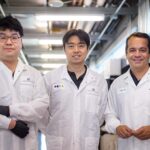As geopolitical tensions rise, Nkarta CEO Paul Hastings is urging the U.S. government not to impose restrictions on Chinese scientific collaboration and refocus on what matters most: the patient.
“Right now, in the environment that we’re in, the patients are a little bit out there in the atmosphere, floating around, wondering when they’re going to be first again,” Hastings said Oct. 8 during Fierce Biotech Week. “We have to come back to patients first in our industry.”
President Donald Trump has telegraphed a new round of 100% tariffs on all Chinese imports beginning in November. The U.S. has also recommitted to imposing a base tariff rate of 15% on most goods imported from Europe, including branded pharmaceuticals.
“Tariffs are not good for anyone, and most importantly, for patients,” according to Hastings, who formerly chaired the Biotechnology Innovation Organization (BIO). “They’re going to drive up the cost of … the therapeutic that you come up with.”
And while Nkarta’s efforts are all stateside, most small U.S. companies that do outsource work will be hit the hardest by tariffs, Hastings explained.
The Nkarta CEO acknowledged the importance of federal measures surrounding international operations, such as the BIOSECURE Act, a U.S. bill designed to protect national security and reduce foreign dependence by limiting biotech work with Chinese scientists or companies.
The legislation is made to protect American biotechs from “overly engineered manufacturing coming out of China,” Hastings explained.
But when it comes to licensing innovation from China, the Nkarta executive urged the federal government to “let that one go.”
“We can then make that innovation U.S.-led,” Hastings said in a same-day interview with Fierce that was conducted on the conference sidelines. “Because when you license something, it becomes yours.”
“That’s the one area I wish this administration would let go of,” the CEO reiterated. “Don’t punish someone because they’ve licensed a Chinese asset.”
Related
China’s innovation is integral to the U.S. biopharma scene, with a recent uptick in deals made between the Asian country and international companies as concerns about tariffs, drug pricing and patent expirations rise.
China’s biotech assets carry much cheaper price tags when compared to global peers, with upfront payments about 60% to 70% lower and total deal sizes 40% to 50% smaller, according to a July report from Jefferies.
The East Asian country also provides accelerated timelines and cheaper costs across all facets of development, such as workforce, supply chain and clinical trials.
For all these reasons, a large portion of biotechs depend on Chinese companies for some part of their processes, whether that’s manufacturing, clinical research services or even raw materials coming from the country.
“We have looked at assets from China. I’m interested in some of them, and I’m reluctant to do anything, because I don’t know what’s going to happen if I do,” the biotech leader admitted. “We can have TikTok. Why can’t we have drugs?”
Science without boundaries
Although Nkarta is based in the U.S., much of the biotech’s talent comes from around the world.
“Most of the scientists in my company happen to be people that came here from China—did their Ph.D.’s here—and work at Nkarta because they’re really good scientists,” Hastings explained. “China is a really important player in the field.”
The leader emphasized the importance of valuing scientists and innovation, regardless of geographic origins. Hastings underscored his point by sharing his own experience as a patient with severe Crohn’s disease.
If his Crohn’s was active and “someone in China came up with a therapeutic that worked, I’d sure be the first in line to get it—whether it was discovered in Canada or China or Europe or anywhere else around the world,” Hastings explained. “Science should have no boundaries.”
Related
In his second year of pharmacy school, Hastings had suffered a severe flare-up that ultimately led to the removal of his colon.
“When I woke up from that surgery, I was a different person,” he said. It was then that the leader decided that instead of practicing pharmacy, he’d rather be discovering and developing new therapeutics for patients.
“I do have a strong opinion about biotech and innovation—I’ve devoted my life to it,” Hastings said. “It’s an incredible industry, and one that we need to continue to own.
“The U.S.A. is the kingpin of innovation and the kingpin of reimbursing for innovation,” the CEO said. “And now we’re going to be socializing pricing, so it’s a tough place to be and needs to be navigated through carefully.”


